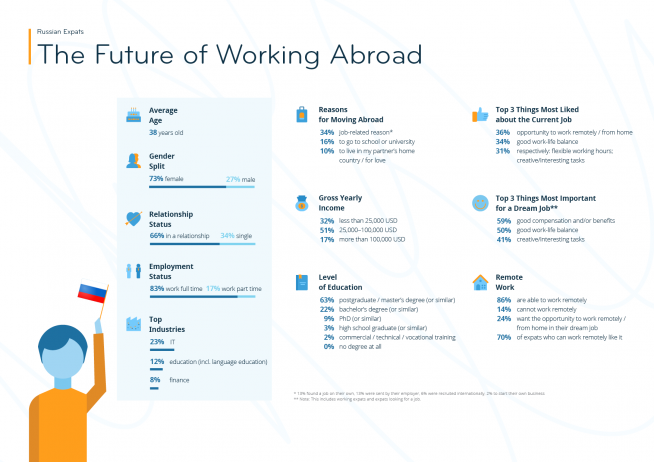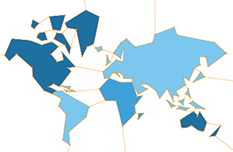Many Russian Expats Work Fully Remotely
Why do Russians move abroad? According to the Expat Insider 2021 survey by InterNations, 34% of Russians working abroad name their career as the most important reason for relocating to another country. While this is the most cited reason among Russian expats, this share is considerably smaller than the global average of working expats citing job-related reasons for their move (47%).
Most of the Russian expats were sent abroad by their employer or found a job on their own (13% each). Just 6% were recruited internationally, compared to 15% globally, and 2% moved abroad to start their own business. Aside from work-related reasons, an above-average share of Russian expats working abroad (16%) mainly relocated because they wanted to go to school or university in their current country of residence (vs. 8% globally).
The Typical Russian Expat Working Abroad
The typical Russian expat working abroad differs quite a bit from the average working expat worldwide. They are on average 38 years old, which is much younger than the global average of 43.1 years. In addition to that, close to three-quarters (73%) are female, while globally just 46% of working expats are women. They are also slightly more likely to be in a committed relationship (66%) than the average respondent working abroad (61%). However, 83% work full time, which is more or less the same as the worldwide average (82%).
Close to one-quarter of Russian expats (23%) work in the field of IT, compared to 11% of expats globally. IT as the most common field of work among Russians working abroad is followed by education (12%) and finance (8%).
Well Educated and Working in Senior Positions
Overall, Russians working abroad are highly educated. Nearly two in three (63%) hold a postgraduate/master’s degree, 16 percentage points more than the global average (47%). Another 9% have a PhD (vs. 8% globally). Just 22% say that a bachelor’s degree is their highest level of formal education, compared to 33% globally.
Perhaps due to this high level of education, nearly two in five (37%) work in a senior or specialist position, seven percentage points higher than the global average (30%). However, they are underrepresented among top managers / executives (8% vs. 13% globally), while nearly one in five (19%) work in lower/middle management (vs. 17% globally).
Lastly, Russian expats seem to like being their own boss: 14% are self-employed / freelancers (vs. 11% globally), and another 7% have their own business, which is on par with the global average (7%).
Russians Working Abroad Enjoy Shorter Working Hours ...
Russian expats are quite happy with their job: 73% rate their overall job satisfaction positively, which is the same as the global average (73%). They are even happier than expats globally with the state of the local economy in their respective destination (68% vs. 65% globally) and their personal working hours (74% vs. 70% globally). In fact, the average working hours amount to 38.8 hours per week among Russian expats, which is over an hour less than the global average (39.9 hours).
This is interesting when looking at Russian expats’ most frequent destinations: These are Germany and the United States, followed by the Netherlands, Spain, and Finland. According to all expats living there, Finland is the only country that performs well for both the local state of the economy (12th) and working hours (10th). Germany and the Netherlands at least make it into the top 10 worldwide for the state of the local economy, while they rank in the top 20 for working hours. The USA and Spain, however, show a mediocre to poor performance for both factors. A Russian expat living in Granada, Spain, even says that the “lack of job opportunities” is what she dislikes most about life in Spain.
…and Work Remotely More Often than Other Expats
When asked what they like most about their current jobs, 36% of Russian expats cite the opportunity to work remotely / from home. In fact, 86% of them are able to work remotely, compared to 78% globally. The majority also enjoys remote work (70%) — 34% even like it very much.
More than seven in ten (72%) state that they can work remotely, while 14% can work remotely but usually prefer not to. Just 8% are unable to work remotely due to the nature of their job — which is only half the share of expats worldwide (16%). Knowing that many Russian expats work in IT, this hardly comes as a surprise.
Half the Russian expats who are able to work remotely (50%) even work fully remotely, which is eleven percentage points more than the global average (39%). Another 20% work remotely for more than 15 days per month (vs. 18% globally), whereas just 18% work remotely for up to five days per month (vs. 25% globally).
The COVID-19 pandemic has had an impact on the remote work policies for 47% of Russians working abroad: 33% are now able to work remotely more often than before (vs. 28% globally), but only 14% say that remote work was newly introduced and is here to stay for them (vs. 20% globally). Remote work is an aspect that Russian expats do not want to miss out on: when asked about their dream job, 24% say that the opportunity to work remotely / from home is important to them.
A Good Compensation Tops the Dream Job Wish List
There are, however, a few aspects that are even more important for Russian expats when they imagine an ideal work environment: the most popular answer option is a good compensation and/or benefits (59%), which is also the most important aspect for expats worldwide (54%).
This factor is followed by a good work-life balance (50%), creative/interesting tasks (41%), and flexible working hours (25%). The opportunity to work remotely / from home comes 5th in the ranking of the most important aspects for Russian expats.
“While a good compensation is the most important aspect for Russians working abroad, it is not everything they are looking for in a job,” says Malte Zeeck, InterNations Founder and Co-CEO. “Many aspects they mention — especially the importance of creative and challenging tasks — are closely related to the concept of New Work, which describes a new way of working in the global and digital age. Factors that are important in this concept are, for example, autonomy, freedom, creativity, personal development, and self-fulfillment. Looking at the most common destinations where Russian expats work, they might be able to find jobs fulfilling these criteria there!”
Russian Expats May Find Modern Approaches to Work Abroad
In fact, three out of the five most common destinations for Russians working abroad rank in the top 5 worldwide when it comes to expats comparing the importance of New Work in the local business culture. The USA tops the list (1st), followed by Finland (3rd), and the Netherlands (5th). For example, 74% of expats living and working in the USA say that New Work plays an important role in the local business culture.
Just 50% of expats say this about Russia, ranking the country 31st out of 55 destinations for this factor. In fact, 55% of Russians working abroad believe that the concept of New Work is more important in their current country of residence than back home.
However, Germany and Spain, which are also popular among Russian expats, rank even worse here: Germany lands in 35th place, and Spain even ends up among the bottom 10 destinations worldwide (48th). More than one-quarter of expats in Spain (26%) say that New Work is not important in local business.




